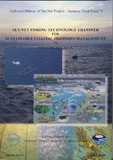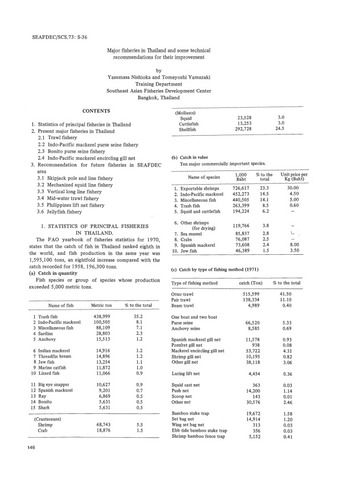Set-net Fishing Technology Transfer for Sustainable Coastal Fisheries Management in Southeast Asian
Share
Abstract
Most coastal fisheries resources of the developing countries including the Southeast Asian countries are overexploited because of the high demand for fishery products and the modernization of fishing technology. Moreover, since coastal fisheries in the region are small-scale fisheries, coastal fishermen are vulnerable to competition and are often confronted with the conflicts in fishing operations with the decreasing resources. In order to cope with such realities, it has become urgent for fishery management authorities to consider and develop various alternative approaches to the existing fishery activities and management considering such real problems in fisheries.
SEAFDEC/TD implemented a pilot project in Rayong Province which was generally aimed at promoting the set-net as a tool for sustainable coastal fisheries management. Specifically, the project aimed to introduce the set-net fisheries as means of reducing the fishing pressure on coastal fisheries resources; alleviating fishing competition among the various fishing gear types; organizing group cooperation for fishing operations; developing a common policy concept for coastal fisheries management; and enhancing the community's concept on coastal conservation.
SEAFDEC is hopeful that in the near future, fisheries cooperative could be developed in our region. Moreover, SEAFDEC also envisaged that in the long run, the coastal fisheries resources and fishing will be managed by the fishermen themselves following appropriate guideline from respective national governments.
Based on the successful implementation of the Set-Net project in Rayong Province, Thailand, and considering the five years experience together with the compiled data emanating from the project, SEAFDEC will promote the Set-Net as an Eco-Friendly Fishing Gear for Sustainable Coastal Fisheries Management in the ASEAN region. This Technical Manual which includes the rationale and objectives as well as the methods and techniques in implementing set-net fisheries could serve as a good guide for those who intend to start a similar project in their respective countries to manage their coastal fisheries in a responsible manner.
With lesson learned and experience gained from the successful Se-Net project in Rayong Province, SEAFDEC welcomes request for technical assistance in the setting up of a similar set-net project in the countries in the ASEAN region.
Paksa
Mga koleksyon
Related items
Showing items related by title, author, creator and subject.
-
The Status of Fisheries in the Republic of Maldives
Faiz, Mohamed (Training Department, Southeast Asian Fisheries Development Center, 1997)The paper discusses the tuna fisheries in Maldives which dominates its fishing industry. Apart from a very strong domestic market, tuna is also the main export commodity of the country. Moreover, reef fisheries such as, ... -
Major fisheries in Thailand and some technical recommendations for their improvement
Nishioka, Yasumasa; Yamazaki, Tomeyoshi (Japan International Cooperation Agency, 1977)Presented in this paper is the development of fisheries industry in Thailand. The data on the production of the principal fisheries species and major fishing methods are also presented. Also included are the recommendations ... -
Status of Fishing Conditions in Cambodia
Sour, Kim; Vuthy, Ros (Training Department, Southeast Asian Fisheries Development Center, 1997)Fisheries in plays a very important role in Cambodia’s national economic development. Total fish catch production in 1996 was 104 310 tones, about which 60% was contributed by inland capture fisheries, 30% by marine capture ...





